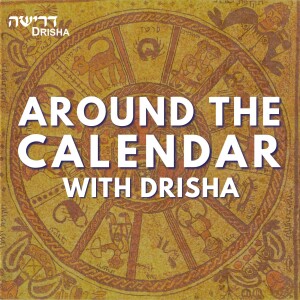Around the Calendar with Drisha
Over the years, Drisha has offered Torah classes on the many observances that mark out the timeline of the Jewish yearly cycle. Around the Calendar brings you all our holiday- and observance-focused classes, from our back catalog of recordings and continuing through our contemporary shiurim and lectures.
Episodes

Monday May 19, 2025
Monday May 19, 2025
This series considers a few distinct directions in which Avodat Yom ha-Kippurim is re-lived today, through rituals and liturgies:Rituals relating to atonement, specifically Kapparot and Tashlikh. 3Amitz Koach and other Piyyutim about the Temple service itself.Pleas for atonement that correlate with aspects of the Yom Kippur Temple service, including Selihot and Vidduy.

Monday May 19, 2025
Monday May 19, 2025
This series considers a few distinct directions in which Avodat Yom ha-Kippurim is re-lived today, through rituals and liturgies:Rituals relating to atonement, specifically Kapparot and Tashlikh. 3Amitz Koach and other Piyyutim about the Temple service itself.Pleas for atonement that correlate with aspects of the Yom Kippur Temple service, including Selihot and Vidduy.

Monday May 19, 2025
Monday May 19, 2025
This series considers a few distinct directions in which Avodat Yom ha-Kippurim is re-lived today, through rituals and liturgies:Rituals relating to atonement, specifically Kapparot and Tashlikh. 3Amitz Koach and other Piyyutim about the Temple service itself.Pleas for atonement that correlate with aspects of the Yom Kippur Temple service, including Selihot and Vidduy.

Monday May 19, 2025
Monday May 19, 2025
We often think of the liturgy for the Yamim Noraim as static words confined to the pages of the machzor. However, these prayers draw from the rich tapestry of the Tanakh.In the first part of this two-part series, we’ll explore the biblical inspiration that breathes life into Psalm 27, sometimes called “L’David Hashem.” Many have the practice of adding this psalm to their daily prayers during Elul and Tishrei. This psalm-prayer has intriguing intertextual parallels with the passages in Tanakh that describe a city of refuge, a connection that holds rich significance if we read the psalm as a meditation on guilt and responsibility.In part two, we’ll explore the passages from the book of Nehemiah that become climactic phrases used in Selichot, the prayer added during Elul and on Yom Kippur. Understanding the desperation and hope that characterized Nehemiah’s time period yields add meaning to the recitation of these prayers.

Monday May 19, 2025
Monday May 19, 2025
We often think of the liturgy for the Yamim Noraim as static words confined to the pages of the machzor. However, these prayers draw from the rich tapestry of the Tanakh.In the first part of this two-part series, we’ll explore the biblical inspiration that breathes life into Psalm 27, sometimes called “L’David Hashem.” Many have the practice of adding this psalm to their daily prayers during Elul and Tishrei. This psalm-prayer has intriguing intertextual parallels with the passages in Tanakh that describe a city of refuge, a connection that holds rich significance if we read the psalm as a meditation on guilt and responsibility.In part two, we’ll explore the passages from the book of Nehemiah that become climactic phrases used in Selichot, the prayer added during Elul and on Yom Kippur. Understanding the desperation and hope that characterized Nehemiah’s time period yields add meaning to the recitation of these prayers.

Monday May 19, 2025
Monday May 19, 2025
Yom Kippur is a dramatic day, but that drama is often compounded by additional circumstances. We will learn aggadot and halakhic literature about various Yom Kippurs throughout history, from biblical and rabbinic times, through observance of the fast during a cholera epidemic, and up to the Yom Kippur war.

Monday May 19, 2025
Monday May 19, 2025
Yom Kippur is a dramatic day, but that drama is often compounded by additional circumstances. We will learn aggadot and halakhic literature about various Yom Kippurs throughout history, from biblical and rabbinic times, through observance of the fast during a cholera epidemic, and up to the Yom Kippur war.

Monday May 19, 2025
Monday May 19, 2025
In this series, we will reflect together on several chapters of Psalms which are associated by their content and tradition with the Yamim Noraim season. For those who would like to follow along independently, sources are available here: https://www.sefaria.org/Psalms.51?lang=bi https://www.sefaria.org/II_Samuel.11?lang=bi https://www.sefaria.org/II_Samuel.12?lang=bi

Monday May 19, 2025
Monday May 19, 2025
In this series, we will reflect together on several chapters of Psalms which are associated by their content and tradition with the Yamim Noraim season. For those who would like to follow along independently, sources are available here: https://www.sefaria.org/Psalms.51?lang=bi https://www.sefaria.org/II_Samuel.11?lang=bi https://www.sefaria.org/II_Samuel.12?lang=bi

Monday May 19, 2025
Monday May 19, 2025
In this series, we will reflect together on several chapters of Psalms which are associated by their content and tradition with the Yamim Noraim season. For those who would like to follow along independently, sources are available here: https://www.sefaria.org/Psalms.51?lang=bi https://www.sefaria.org/II_Samuel.11?lang=bi https://www.sefaria.org/II_Samuel.12?lang=bi







